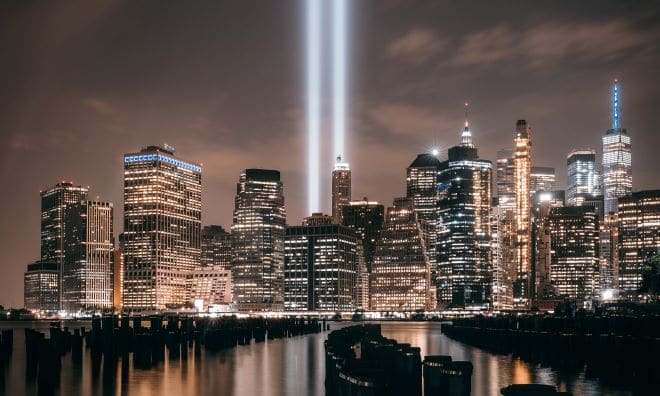
07 Sep Principled Reaction to National Tragedies
Twenty years ago, your blogger was in Detroit getting ready to deliver closing arguments in a jury trial that had been going on for over a week. On the morning of the 11th, a clear, spectacularly beautiful day in Michigan, anticipation was building inside the courthouse for the climax of what had been a tense, hard-fought case between two companies.
And soon the phone rang with word of airplanes hitting the World Trade Center in New York and of other hijacked planes believed to be menacing the skies of America.
The judge asked the lawyers if we wanted to go forward or delay the trial. The litigants agreed it was best to proceed, instantly realizing things would not be back to normal any time soon. As we are prone to do, in our closing arguments later that morning, both lawyers reacted to the shocking events by comparing our clients to “good people” who had been attacked viciously by “bad people” on the other side. We both stopped just short of analogizing the opposing parties to terrorists.
Those were our first lawyerly reactions to what quickly became an obvious national tragedy—determination to move forward, trying to make the best of a terrible situation.
This Saturday, of course, is the 20th anniversary of September 11, 2001.
Selfishness and Exploitation
But just how should America, as a nation, react to national tragedies? More specifically, how should our political leaders respond when huge natural disasters, crises, and other all-encompassing threats occur?
There is a political adage, often attributed to Winston Churchill, that advises, “Never let a good crisis go to waste.” Principle Based Politics does not like that adage, which we think is too cynical. The saying implies that one should take advantage of bad things that happen. It goes beyond the nicer sounding “make lemons out of lemonade.” It sounds exploitive. It sounds selfish.
Instead, we think, as we always do, the better advice is for principles to control, even when facing a crisis.
It may help to explain our thinking with a chart. Below, we will list some of the major tragedies our country has faced, the actual response, and what a principled response could have been.
National Tragedy/Crisis
Actual Response
Principled Response
9/11 terrorist attacks
War on Terror resolution passed by Congress three days later, with military action lasting in Iraq and Afghanistan for 20 years
First understand the crisis, identify apt principles like freedom and protecting the vulnerable, and follow the controlling principles
Hurricane Katrina
Federal agencies and charities provided relief, but extensive political criticism of local, state, and federal government preparedness and responses followed
Service-minded leaders follow principles of dignity, protecting the vulnerable, and limited government to cooperate and help the victims
Financial crisis of 2007-08
Congress passed banking and business reform laws and new regulations; government bailouts saved some big corporations
Federal leaders honor principles of service and limited government to enact only laws necessary to meet real needs that others cannot
Covid-19 pandemic
Partisan political fighting over blame, restrictions, and stimulus, with government taking on a bigger role in America
Again, understand the problem first (including the science), then apply principles of freedom, transparency, and protecting the vulnerable while limiting federal action to nationwide issues like health guidance and vaccines; no political advantage-taking
Although such situations often involve complex, multi-faceted responses, we believe a principled-based approach provides a thoughtful, effective framework for those responses. The way we view it, national crises need not always lead to increased regulation or government control. These events obviously need not lead to war (although there may be times when military action is in fact necessary). And they certainly do not always need to produce the kind of selfishness, political fighting, and exploitation often seen in responses, particularly in the Katrina and Covid-19 tragedies.
9/12 and Following
After the closing arguments, jury deliberations, and a hasty verdict in the Detroit trial referenced at the beginning of this post, your blogger and his colleague had no choice that day and night but to drive their rental car all the way back to Minnesota. As a result, while we may have been the last people in America to see video footage of the Twin Towers being hit or falling, we did “get” to hear 12 hours of radio coverage as we drove. America’s initial reaction to the attack? Confusion, for one thing; all of the facts seemed to be unclear or wrong. But another reaction, sadly, was racism and petty concern from radio guests about what this would do to gas prices. It was embarrassing for our nation, quite frankly.
Soon thereafter, however, America started to pull itself together. We all seemed to appreciate our country a little more than we had. Incredible, unselfish acts of first-responder heroism were appropriately lauded. Churches filled up the following weekend. Political strife even fell to its lowest level in generations.
National emergencies, catastrophes, and predicaments offer opportunities for unity. Principled responses can help achieve that unity, a national togetherness that will endure.
Written by Quentin R. Wittrock, founder of Principle Based Politics.
Look for his posts twice each week, as this blog will explore and promote the idea of principle in politics, both as to individual elected leaders and our federal government as an institution.


No Comments